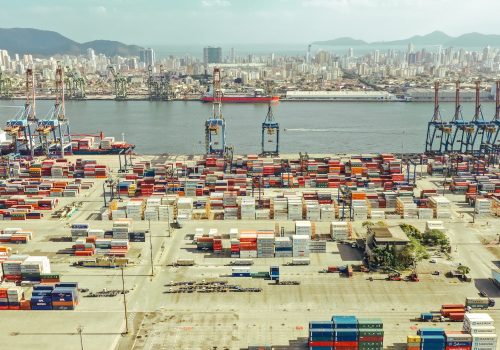As the global community continues to grapple with the coronavirus (COVID-19), the Atlantic Council is open for business. Our business, meetings, and events, however, are occurring virtually. For more information, please read an update from our President and CEO.
Event Summary
On April 16, 2020, minutes after Brazilian President Jair Bolsonaro fired his Minister of Health, Luiz Henrique Mandetta, following weeks of tension as they disagreed on the best response to combat the pandemic, the Atlantic Council’s Adrienne Arsht Latin America Center and the Brazilian Center for International Relations (CEBRI) hosted a conversation on the health, political, and economic implications of COVID-19 in Brazil. With a special participation by Teresa Rossi, project coordinator at CEBRI, the conversation counted with the expertise and analysis of Alana Rizzo, founder of Redes Cordiais and an advisor at the Americas Practice at Albright Stonebridge Group; Ricardo Sennes, managing partner at Prospectiva Consultoria and a non-resident senior fellow at the Adrienne Arsht Latin America Center and CEBRI; Hussein Kalout, political scientist and research scholar at Harvard University and former special secretary of strategic affairs of Brazil; and Roberta Braga, associate director at the Adrienne Arsht Latin America Center.
To kick off the discussion, as the new Minister of Health, Nelson Teich, was sworn in, Rizzo noted that Minister Teich had the potential to unify narratives and open dialogue regarding the most effective measures to deal with this unprecedented pandemic. However, Sennes noted that Minister Teich could find himself in a “major political trap,” as he lacks experience dealing with the bureaucracy of the Brazilian public health system.
On Brazil’s response to the coronavirus crisis, Sennes described it as ambiguous, saying, “… [there is] permanent confusion between different strategists to address the same problem,” identifying three principal dualities. First, President Bolsonaro, who has advocated against strict isolation measures, particularly as they implicate economic slowdown, versus others in his administration. Second, the federal government versus the state administrations, as governors lead locally to implement isolation measures, despite President Bolsonaro’s push to relax quarantine, which would include opening up businesses. Third, the division of responsibilities, as the federal government controls the resources to address economic needs while local governments have jurisdiction over health programs.
For Sennes, this ambiguous response is harmful to the economy, as it creates a scenario of instability and uncertainty, damaging trust of foreign investors. To address this issue, he suggests creating more economic packages, like the Minister of Economy’s infrastructure package, to be implemented once the virus is contained in order to instill confidence by demonstrating that the government is taking concrete actions to reinvigorate the economy. Kalout also encouraged more programs for small and medium enterprises to avoid long-lasting economic damage. For Rizzo, this pandemic brought about an opportunity for the government to further cooperate with the private sector on ways to solve economic issues risen from this pandemic.
Among other priorities to mitigate the economic impacts of the coronavirus in Brazil, Kalout emphasized the need to help the lower classes, which Rizzo said would require identifying the most vulnerable rather than simply helping those already enrolled in social programs. “We need to check that we’re getting to the people who need the most help,” she declared, adding that “we need to plan and work to find others.”
In the context of political polarization, as state governments experience increased visibility and local elections are supposed to be held in October, Rizzo said that “if this crisis goes wrong and [President Bolsonaro] is seen as responsible [for it], then the governors will get more power and respect and will decide where the political forces are going.”
Sennes, Kalout, and Rizzo also discussed how President Bolsonaro is seen as intentionally polarizing. For Kalout, following a similar approach taken during the 2018 presidential elections, President Bolsonaro fosters his image as an anti-establishment leader, and uses social media as a platform to disseminate his ideas. Sennes added that despite being politically isolated, President Bolsonaro maintains a 30-percent approval rating in public opinion polls, which is only possible because he “continues to address a specific agenda for a specific population.” Kalout believes that with such a strategy, President Bolsonaro is consolidating a permanent base that will be devoutly loyal. However, during the COVID-19 crisis, Kalout said, “[President Bolsonaro has lost the capacity to govern. The Supreme Court said the government can’t make public propaganda against the quarantine, and the president cannot interfere with decisions at the state or municipal level. This took away Bolsonaro’s ability to act.”
As the country works to flatten the curve, Rizzo, Kalout, and Sennes agreed that the country should look toward the future in its plans for economic packages, and elections. Lauding the subnational coordination by governors, Rizzo reemphasized the current opportunity for further cooperation with private sectors and between multiple tiers of government in order to reduce Brazil’s duality disparity and create trust and confidence in its citizens and foreign partners.

